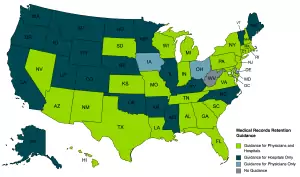Medical records retention is a top concern for medical providers everywhere. There are a host of reasons why retention matters, but there is no one set of federal guidelines for all hospitals, doctors, and physicians across the country to incorporate and adhere to. HIPAA guidelines set rules for retaining certain records at the federal level, but for personal medical information, it’s left to the individual states.

This leaves providers with a bit of a challenge, as many ask, “What do I do with my records if my state isn’t clear on retention periods?” The good news is that while your state may offer limited guidance in the form of medical records retention laws, there are other sources to help you understand retention best practices for your medical practice and the state in which you operate.
Even Without Guidance, Retention Still Matters
The first step to navigating retention policy in the face of vague or absent retention standards is to understand that the lack of governance from your state doesn’t mean retention doesn’t matter. In some states, where retention guidance is limited or conflicting, some providers make the mistake of ignoring retention or at least not storing the records in a way that can be easily retrieved when needed.
This is a mistake, simply because the most impactful penalties from poor retention strategies and habits aren’t legal penalties. They come in the form of lapses in continuity of patient care, inability to produce records in the face of legal discovery, and “cleaning up” the messes that poor retention practices create. This harms patients and can devastate the practice ownership, even if the practice is closed. Retention still matters, even if policies make it seem not so.
Other Sources for Retention Standards
Recognizing the importance of sound medical records retention strategies is only the first step to navigating medical records retention without clear or sufficient state-level guidance. The next step in creating a secure retention strategy is to consult other sources for guidance on retention in your state.
In some states, where state law lacks guidance, state medical boards and other similar associations often take on the role. While the situation varies from state to state, your state medical board can often offer some level of guidance.
Medicare and Medicaid programs also enforce retention policies for patients who use the resource to obtain medical services. And while these guidelines aren’t sufficient for creating an entire retention policy, it’s smart to be aware of them and include their guidance in any retention policy you enforce. One good rule of thumb for retention policy is to follow the federal guideline of a minimum of ten years retention period for records of patient interactions and services supported by Medicare or Medicaid.
These are a few outside sources that may shed some light on retention best practices in your state. However, remember to exercise caution when researching retention standards on the internet. Often, online sources present “retention policies” or “retention standards” that are not based on any existing laws or guidance. Be aware before applying their standards to your own retention policy.
There’s More Than One Reason for Retention
Another important process to undertake when navigating medical records retention in a state that doesn’t offer clear medical records retention guidance is to recognize the other crucial factors that drive records retention. When state laws don’t offer enough guidance, a dedication to solid patient care and sound future planning can be a light on the path for care providers looking to understand records retention policy.
The first item to consider when navigating retention policies with limited guidance is the impact that records retention (or a lack thereof) has on patient care. Good patient care will always require a certain amount of record keeping – a minimum standard, and that record keeping usually extends beyond the last date of care for practical reasons. Top physicians and healthcare professionals know that good patient care might mean retaining records for even longer than what’s required by existing retention standards and won’t let the lack of a clear standard prevent them from delivering continuous care to patients with recurring or long-term health needs.
The chance of a record being subject to legal discovery for use in court proceedings also merits a well-tailored retention policy. Almost nothing is more stressful for a retired care provider or physician than being called on to produce a record down the road and being unable to do so, whether due to poor retention practices that make it difficult to find and produce records, or due to not keeping the records at all.
In short, there are plenty of reasons to take retention seriously, and a few factors to consider in helping you determine retention policy for patient medical data, whether prioritizing continuity of care or preventing legal headaches down the road. Even still, this data may not be enough to navigate a labyrinth of conflicting laws or to act confidently in the absence of guidance. That’s where the last step comes in.
Call in the Pros
If you’re a physician, private practitioner, or hospital administrator that’s serious about retention but confused by insufficient or complex state guidance, contacting professionals at Cariend is the ultimate solution to your problems. The team at Cariend are experts on retention policy in all fifty states and can help you navigate medical records retention and retention policy no matter what your state or situation and can help you tailor a retention plan that’s one hundred percent compliant with your state’s guidance, other applicable laws and regulations, and your patient care needs. Contact Cariend today to learn more.











